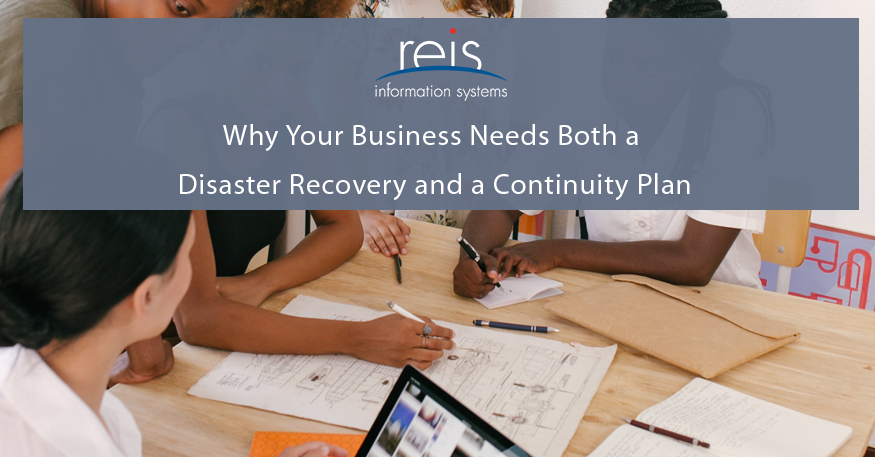These are uncertain times. As you have probably experienced, these documents are needed. Keep reading to learn more about why you need these documents.
As you have more than likely experienced first hand in recent times, a disaster recovery plan and a business continuity plan are essential for your business to keep working and moving forward.
For this post, we thought it would be beneficial to explain these two documents and why you should have them handy.
Are you prepared to work from home? Check out to see if you are.
When it comes to protecting a business’ data, it’s critical to understand the differences and to plan ahead. These differences come from usage and application after a disaster arises.
The definitions of these terms:
Business continuity (BC) consists of a plan of action. It ensures that regular business will continue even during a disaster.
Disaster recovery (DR) is a subset of business continuity planning. Disaster recovery plans are for restoring vital support systems. Those systems include communication, hardware, and other IT assets. DR aims to minimize downtime of a business and is focused on getting the technical operations back to normal in the shortest amount of time as possible.
The steps to follow when creating these documents:
Disaster Planning > Business Impact Analysis > Business Continuity Management > Business Continuity Plan > Recovery Time Objectives > Deployment
Business Continuity (BC) Has a Wider Scope
The management of BC refers to the processes and procedures that are associated with making sure that regular business operations continue during a disaster. This can ultimately mean the difference between the business surviving or shutting doors.
Misconceptions:
- “We will know what to do in an emergency”
- “We have insurance that will cover losses”
- “We don’t have time to develop a BC plan”
- “BC and DR planning are the same”
Make sure to:
- Focus on business processes and what to do in the event of a disaster
Asses benefits vs costs, which functions are critical, priority list, etc.
- Designated resources
Are the most essential (can include support, equipment, software, stock), identify key staff.
- Focus on customers and supply chain
Suppliers must know that invoices are out and ready for payment. Customers must be positive that their orders will be filled or delayed temporarily, with a possible discount.
- Replace and recover IT systems
This contains valuable business data. Is your company using data backup and recovery? Failover is when a secondary system starts when the first one goes down.
Disaster Recovery (DR) Plan
Like we explained earlier, DR is a subset of a total business continuity plan. A DR plan includes getting systems up and running after an emergency.
IT disasters can range from small hardware failures to massive breaches.
Many businesses file for bankruptcy if there is an IT disaster. One cause of this is a lack of a written plan. This plan should include a business impact analysis. There are many business who have the plan written, but neglect to update it.
Planning for infrastructure technology related failures also include a lack of recovery and BC guides. Some questions to ask include: how do you restore each critical application in your structure? How long will it take to restore the system with backups? What is the restore point tolerance? If there is no one responsible for data recovery preparedness, how does it occur?
Benefits of Disaster Recovery (DR):
- Cost efficiency
This includes: preventive measures that reduce the risk of a human disaster, detective measures, corrective measures.
Your business will need to run an analysis for potential threats, keep IT systems up-to-date, seek innovative solutions.
On-time updates and deciding to use innovative hardware and software can likely save businesses money in the long run. Cloud based applications are also gaining more traction as a solution instead of local storage and operations.
- Increased employee productivity
When roles and responsibilities are assigned in advance, effectiveness and productivity will rise.
- Greater customer retention
DR planning ensures that businesses will maintain a high service quality, regardless of the circumstances. With reducing the risk of downtime and data loss, this means that clients will receive the service they expect.
- Better understanding of scalability
Look into innovative solutions – for example cloud based storage and backups.
Things To Keep in Mind
A business insurance policy might only cover the loss or damage to inventor and equipment. But, if your business survives a disaster, with no effective planning, there could be losses including:
- Financial (lost profits, lower market share, government fines because of a data breach)
- Damage to the business’ reputation
- Breach of contract
- Stalled business objectives and plans
Maybe you have some more spare time than usual, so take a look at a new books we recommend.
Request Your Complimentary Consultation!
Sources:
Dobran, Bojana. (2018). Business Continuity vs Disaster Recovery: What’s The Difference? Retrieved April 7, 2020 from https://phoenixnap.com/blog/business-continuity-vs-disaster-recovery
Evolve IP. (2018). 4 Benefits of Disaster Recovery Planning. Retrieved April 7, 2020 from https://www.evolveip.net/blog/4-benefits-disaster-recovery-planning
Travelers Risk Control. (2020). Why Is Business Continuity Important. Retrieved April 7, 2020 from https://www.travelers.com/resources/business-continuity/why-is-business-continuity-important

